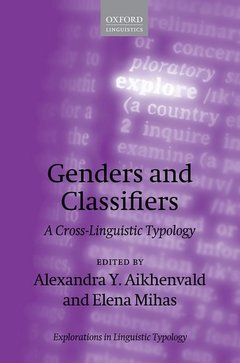Genders and Classifiers A Cross-Linguistic Typology Explorations in Linguistic Typology Series
Langue : Anglais
Coordonnateurs : Aikhenvald Alexandra Y., Mihas Elena I.

This volume offers a comprehensive account of the typology of noun classification across the world's languages. Every language has some means of categorizing objects into humans, or animates, or by their shape, form, size, and function. The most widespread are linguistic genders - grammatical classes of nouns based on core semantic properties such as sex (female and male), animacy, humanness, and also shape and size. Classifiers of several types also serve to categorize entities. Numeral classifiers occur with number words, possessive classifiers appear in the expressions of possession, and verbal classifiers are used on a verb, categorizing its argument. These varied sorts of genders and classifiers can also occur together. This volume elaborates on the expression, usage, history, and meanings of noun categorization devices, exploring their various facets across the languages of South America and Asia, which are known for the diversity of their noun categorization. The volume begins with a typological introduction that outlines the types of noun categorization devices and their expression, scope, functions, and development, as well as sociocultural aspects of their use. The following nine chapters provide in-depth studies of genders and classifiers of different types in a range of South American and Asian languages and language families, including Arawak languages, Zamucoan, Hmong, and Japanese.
Alexandra Y. Aikhenvald is Distinguished Professor, Australian Laureate Fellow, and Director of the Language and Culture Research Centre at James Cook University. She is a major authority on languages of the Arawak family, from northern Amazonia, and has written grammars of Bare (1995) and Warekena (1998), Tariana (2003), and Manambu (2008) in addition to essays on various typological and areal topics. She is the editor of The Oxford Handbook of Evidentiality (OUP, 2018) and co-editor, with R. M. W. Dixon, of The Cambridge Handbook of Linguistic Typology (CUP, 2017). Her other major publications with OUP include Imperatives and Commands (2010), Languages of the Amazon (2012), The Art of Grammar (2014), How Gender Shapes the World (2016) and Serial Verbs (2018). Elena I. Mihas has been studying Asheninka and Ashaninka varieties of Kampa Arawak of Peru since 2008, and received her PhD in 2010 from the University of Wisconsin-Milwaukee. She is the author of Upper Perené Narratives of History, Landscape and Ritual (Nebraska University Press, 2014), A Grammar of Alto Perené (Arawak) (Mouton, 2015), and Conversational Structures of Alto Perené (Benjamins, 2017), and of multiple papers on the grammatical aspects of Kampa languages. She is a Visiting Scholar at the Center for Latin American and Caribbean Studies, A United States Department of Education National Resource Center, University of Wisconsin-Milwaukee.
Date de parution : 08-2019
Ouvrage de 334 p.
16x24.2 cm
Thème de Genders and Classifiers :
© 2024 LAVOISIER S.A.S.



